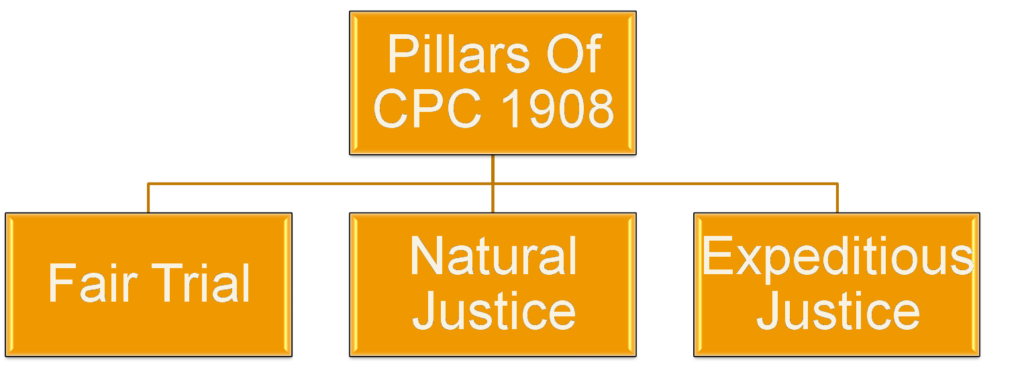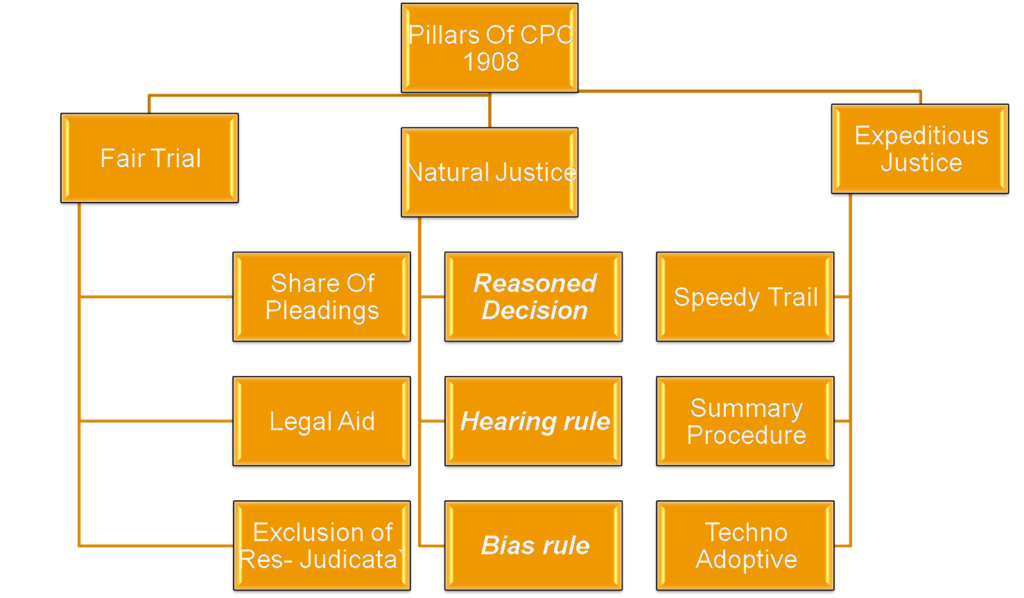

Fair Trial
A “Fair Trial” means each party must know the case of the other party (pleadings) that each party disclose to the other party all documents which are relevant to the subject matter of the dispute between them (discovery and inspection), that the court should determine the points of diffrence between the parties(issues) that each party should be permitted to lead evidence in support of its case(examination of witnesses) and, finally, that each party should be heard before judgement is delivered between a fair trial and expedition.
Subject to the necessary safeguards to ensure a “Fair Trial” the procedure be so simple that “it is easier to decide a case than to invent reasons for not deciding it.
There must be an act of wise and prudent by the Judge to balance these two latin maxims ‘Justice hurried is justice buried‘ and “justice delayed is justice denied.”
Natural Justice
The Preamble to the constitution says that the country will make an effort to ensure “Justice- social, political and economic to all its citizens” This justice of social, political and economic factors is usually referred to as the concept of Natural Justice.
Natural justice simply means the unbiased, fair and just methods of legal proceedings. Ken Binmore in his article ‘Natural Justice’ discusses that “the Apex Court of the country has laid down guidelines for all the courts to ensure fair trial during a legal proceeding and that courts while giving a judgment should insure impartiality, should act fair in all manners, should not be biased in any way and the judgments must be passed in good faith.
Also, the courts must give reasonable time to both the parties to respond to the legal notice and a fair and equal opportunity must be given to them to present their case. The Concept of Natural justice is embedded in the procedural code of the country needs to exemplify the spirit of fair trial or else the whole concept will not be able to take existence. A violation of these principles is actually considered as the violation of the Article 14 of the Constitution of India which entails the Right to Equality.
The right to be heard
The Latin term “audi alteram partem” means “hear the other side too”, or “hear the alternative party too”. This is a very important ingredient in the concept of natural justice and free trial as this ensures a person’s right to be heard. All the courts favour the concept of letting both the parties heard as it guarantees the unbiased nature of the Courts. Since it is such an important feature, it must be included in the civil procedural laws and codes.
In the Code of Civil Procedure too, there are certain provisions which relate to the right of being heard in a free way and in an unbiased manner. Rule 13 of Order IX says that “that in case the summons is not served duly, or if sufficient cause exists, the ex parte decree should be set aside”. The advantage of such a rule is that both the parties of a case get an opportunity to present their side and arguments in front of the Court and get a fair trial as per the procedure of the Court, this despite there being the existence of an ex-parte ruling.
The landmark case of Jolly George Varghese v. Bank of Cochin embodied such a rule, when the Supreme Court laid down the law in this regard.
No one shall be a judge in his own case
The Latin term “Nemo debet esse propria causa” means “no-one should be a judge in their own cause”. In other words, justice should not only be done but should be seen that it is done.
“This right to an unbiased hearing is included under Section 100 A of the CPC, by virtue of which if any appeal from an original or appellate decree is heard and decided by a Single Judge of a High Court, he would have the freedom to have a fixed and unchanging opinion on the issues. His opinion is saved from further prejudice because no further appeal lies from such order of such Single Judge.”
Legal Aid
One of the salient features of the Indian Judiciary is the provision of legal aid. This concept is not recent and has been present since the time of British India. Under the Constitution of India, Article 21 deals with fair trial. A person, who can’t defend his case just because he doesn’t have the money to fight, seems very unfair to the economically backward people..
Furthermore, “according to Article 39A of the Constitution, the State Government has to mandatorily implement a program which helps the people in need of legal aid so that the nature of justice remains unbiased and effective at the same time”.
Under the CPC act, the Order XXXIII, Rule 9A deals with the concept of free legal aid. This order asks all the bodies of Government to follow the rule and that a poor person should not be disadvantaged over a richer person on the basis of finances. The court is asked to provide a lawyer or pleader if the poor person is not in a condition to afford one.
In the case of State of Haryana v. Darshana Devi, the Court said that “the poor shall not be priced out of the justice market by insistence on court-fee and refusal to apply the exemptive provisions of order XXXIII, CPC”
Right To Speedy Trial
With a mammoth number of pending cases and the delay in providing a fair and just judgment, it only makes sense to have right to speedy trials and other methods of providing justice be embodied in the Civil Procedure Code. Civil cases can be settled outside the Court by means of arbitration, lok adalats, etc.
Again, Article 21 emphasizes on the need to have a speedy trial. No person should be harassed by the legal proceedings by delaying the time for justice.
Section 89 of the Civil Procedure Code deals with the settlement of disputes outside the Court by means of arbitration, mediation and conciliation. The Legal Services Authorities Act of 1987 which established Lok Adalats and gave their judgments and awards the requisite statutory backing. With the establishment of such Adalats, the Judiciary gained teeth to deal with delaying of cases. The proceedings sped up.
Right Against Double Jeopardy
Article 20(2) of the Constitution of India provides safeguard from Double Jeopardy. Double Jeopardy simply means that a person cannot be tried for the same offence twice. So a person doesn’t need to go to the court time and again for the same offence. This again helps in speeding up the trial.
The Latin term “res judicata” deals with the same concept.








No comment